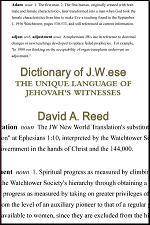Dictionary
of J.W.ese
the unique language
of Jehovah's Witnesses
also available as a
paperback book:

Buy printed book from publisher
DEFINITIONS of
words starting with . . .
A B C D E F G H I
J K L M N O P Q R
S T U V W X Y Z
Definitions
Language's Role in Control
Orwell’s 1984 and J.W.ese
Language with an Agenda
J.W.ese Changes on Command
Breaking the Language Barrier
The Author’s Testimony
Acknowledgments
Key to Abbreviated Refs.
Copyright
|
Acknowledgments This book is constructed almost entirely from my
own vocabulary—the words I
was accustomed to speaking and the expressions I regularly
listened to during thirteen years as an active Jehovah’s Witness. Added to these are a few additional terms I
have encountered in researching the sect since my departure in 1982: new expressions to accompany “new truths”
introduced since then, and some obsolete expressions that had fallen out of use
before my 1969 baptism into the Witnesses.
The words themselves originate, for the most part, with the Watchtower
organization that coined or redefined them.
Other terms have sprung up spontaneously from the worldwide body of
rank-and-file Witnesses in the form of slang expressions, nicknames or abbreviations for more
complex organizational verbiage. About a year after I self-published the initial
forty-four page booklet version of this Dictionary, and at the time when
I was near completion of the present book-length manuscript, I was surprised to
discover on the World Wide Web an Internet website dealing with Jehovah’s
Witness vocabulary. The document titled
Glossary of American English Hacker Theocratese
bears the 1995 copyright of a Mr. Lynn D. Newton, a Jehovah’s Witness elder
from So, my greatest indebtedness for this collection
of words and definitions is to those Jehovah’s Witnesses who introduced me to
“the truth,” trained me in “field service,” and taught me at “the
meetings”—many of whom have since grown old and died, and the remainder of whom
disown any connection with me today.
And, though, toward the end of my time in the sect, I began to develop
an awareness of how language was being used to manipulate me, it was exit counselor
Steven Hassan who helped me put this into broader
perspective by writing in his book Combatting
Cult Mind Control, “A destructive cult typically has its own ‘loaded
language’ of words and expressions.” |